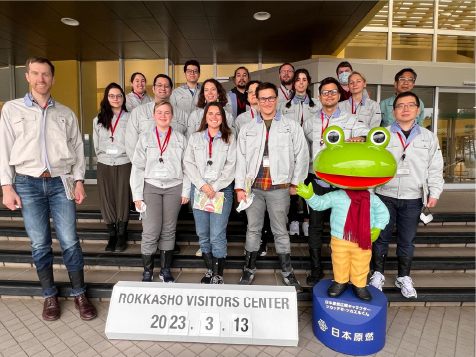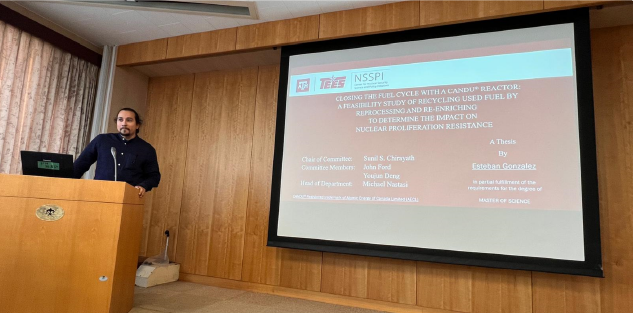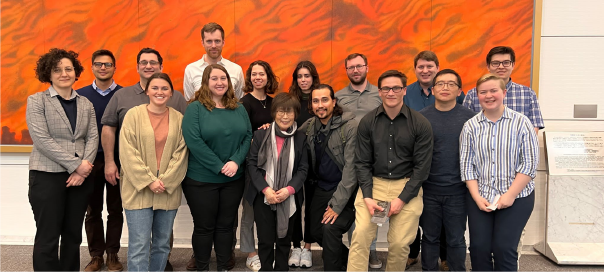From March 13-17, the Center for Nuclear Security Science and Policy Initiatives (NSSPI), along with Argonne National Laboratory, conducted an International Nuclear Facilities Experience (INFE) in Japan. Sponsored by the National Nuclear Security Administration (NNSA)’s Office of International Nuclear Safeguards – Human Capital Development subprogram, the INFE is an opportunity for graduate-level engineering, science, and policy students and early career individuals in the US Department of Energy national laboratory community focusing on nuclear material safeguards to visit advanced operating nuclear fuel cycle facilities in a foreign country. Through this series of technical visits, participants gain an experiential understanding of facility operations and responsible nuclear materials management techniques and procedures.

The participants included nine graduate students from Texas A&M University, the University of Illinois, the University of Tennessee, and the Middlebury Institute for International Studies, a professor from the University of Illinois, and five professionals from Brookhaven National Laboratory, Sandia National Laboratory, Lawrence Livermore National Laboratory, Pacific Northwest National Laboratory, and the National Nuclear Security Administration The trip was led by Dr. Claudio Gariazzo of Argonne National Laboratory.
The 2023 Japan INFE began with a technical visit to Japan Nuclear Fuel Limited’s Rokkasho nuclear site, which consists of a reprocessing plant, a uranium enrichment plant, a vitrified waste processing and storage facility, and the J-MOX construction site. The group then toured the Japan Atomic Energy Agency’s (JAEA) Tokai Reprocessing Plant and Plutonium Fuel Production Facility, followed by Kansai Electric Power Company’s Mihama Nuclear Power Station. At all of these fuel cycle facilities, the participants had the opportunity to discuss material control and accounting measures with facility operators and safeguards managers. Ty Otto, a participant from Pacific Northwest National Laboratory, explained, “Getting to see the actual equipment, ask questions of experts, and get a sense of what safeguards looks like ‘on the ground’ gave me a much more robust and practical understanding that I think will pay off in the future.” Texas A&M student Grace Long added, “Visiting these facilities in Japan, a country that works so closely with the IAEA, offered a new and important perspective on the application of nuclear safeguards in facilities external to the United States.”
Colleagues at the Tokyo Institute of Technology (Tokyo Tech) then hosted an academic symposium between their students and students from Texas A&M. Six students presented material management-relevant research, followed by a dedicated question/answer period for each presentation and a joint lunch celebrating the strong partnership between Tokyo Tech and Texas A&M University.

The final stop on the INFE was the Hiroshima Peace Memorial and Museum, where the participants met with Ms. Keiko Ogura, the final English-speaking survivor of the bombing of Hiroshima. This event was meant to convey the gravity of the chosen career paths of those in attendance and was well-received as an emotionally charged experience bringing all participants together under a common objective that cannot be easily replicated. As Yonggang Cui, a participant from Brookhaven National Laboratory, described, “I believe that after the tour and the meeting, everyone realized why the nuclear safeguards is very important.”

The INFE in Japan gave participants a full view of the application of safeguards at nuclear fuel cycle facilities. According to participant John Leland from the University of Illinois, “It was a tremendous opportunity to learn about nuclear safeguards and security…. It was an eye-opening experience, and it has piqued my interest in safeguards and applications of my research in the field.” The INFE also forms a strong network among the participants through the experience of traveling and visiting as a group. As Grace Long said, “I hope I run into the other INFE attendees in the future!”